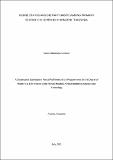| dc.description.abstract | Tanzania is one of the countries where excessive iodine intake has been reported; hence
intervention and identification of possible causes is required. The present study assessed iodine
status and determined the critical contributors to excessive iodine intake in school children
from Kinondoni, Tanzania. A total of 322 pupils and 30 food vendors provided salt samples
for iodine analysis. Urinary iodine concentration (UIC) was spectrophotometrically determined
in 266 sub-sampled children using the ammonium-persulfate digestion method. Information on
dietary habits was collected using the Food Frequency Questionnaire and 24 hours dietary
recall. Anthropometric values were determined by measuring children’s height and weight.
Moreover, Knowledge, Attitude, and Practices study was done using a modified specific iodine
deficiency-related questionnaire. Of the salt samples, 87% were adequately iodized with mean
53.94 ± 13.02, indicating over iodization. The median UIC was 401 µg/L, signifying excessive
iodine intake. Twelve percent were overweight or obese and only 46.6% of pupils and 53.3%
of food vendors had good knowledge of iodized salt utilization. Discretionary salt use (67.3%),
higher consumption of potato chips (53.5%) and fried cassava (59.0%) were associated with a
higher risk of excessive iodine intake. Potato chips (Adjusted Odds Ratio [AOR] =9.04, 95%
CI: 3.61-22.63) and fried cassava consumption for 4-7 days/week (AOR=11.08, 95% CI: 3.45-
35.54) were significantly associated with excessive iodine intake. Discretionary salt intake
significantly contributes to the high iodine status of schoolchildren in the study area. This effect
can be reduced by public health campaigns to decrease salt consumption and improve salt
iodation practices. | en_US |

